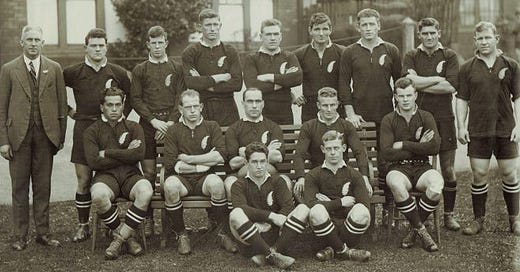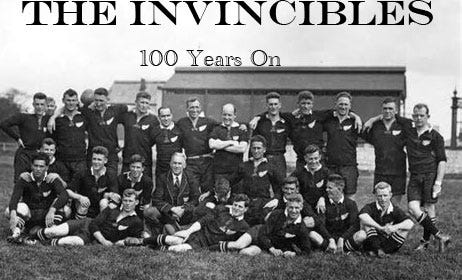If Swansea proved a breeze, Newport, the All Blacks' next opponent, would not go down the same way, and in a forerunner to a later event in the tour, the game proved a harbinger.
It was clear to all that the New Zealanders had the most gifted attacking back in the game in Bert Cooke. He had cut a merry path through all the earlier games he was involved in.
Newport presented a formidable challenge, pushing the All Blacks to their limits. It was a hard-fought game that would only be decided in the final stages as the All Blacks searched for the path to victory.
Mark Nicholls, who started again at first five-eighths, said the All Blacks arrived in Newport over-confident, but without making many changes from the side that beat Swansea.
All Blacks team against Newport (standing from left), SS Dean, Jack Steel, Mark Nicholls, Cyril Brownlie, Read Masters, Alf West, Maurice Brownlie, Andrew ‘Son’ White,Bill Irvine; front row, George Nepia, Quentin Donald, Cliff Porter, Bert Cooke, Handley Brown; in front, Jimmy Mill, Snowy Svenson.
Just as Wales had done in the 1905 Test, Newport played a rover, a tough nut named Tom Jones. He didn't take too long to make an impression. For 15 minutes after the start, Newport hammered the All Blacks' line, before an All Blacks dribbling rush took them to the apparent safety of halfway.
Apparent, because no sooner did they get there than they turned the ball over. After moving the ball wide, Newport turned it inside and forward Bill Friend was on hand to score close to the posts. The All Blacks continued to work for opportunities, but they couldn't complete them when they gained them. Jack Steel looked likely after kicking ahead and chasing, only to see the ball roll into touch while Cliff Porter went close after a blindside move. Then Nicholls set up some action.
From a lineout, the ball was knocked along the ground toward me and, picking up, I ran between their five-eighths and out toward their rover, who was at this moment standing halfway between their centre and fullback. On nearing him, I looked out of the corner of my eye and saw Cooke coming, as only Cooke could, and on drawing the rover I passed and Cooke ran to the fullback with Brown and Steel in support, and the defence hopelessly beaten. Cooke's pass to Brown was a perfect one, but was not accepted, and so the movement failed, and we changed over at halftime five points down.[1]
Just after the start of the second half, Bert Cooke cleared a kick Friend had put ahead to find touch inside Newport's half. But Jones saw his chance and hit Cooke with a charge so late that even the Newport crowd bayed for him to be sent off. Referee A.E. Freethy obliged, but Porter asked the referee not to send him off. Nicholls also spoke for him.
Jones was guilty and should have been sent off, and I can only excuse my intervention on his behalf as an impulse over which I had no control at the moment.[2]
Cooke was taken from the field, looking the worse for wear.
After the incident, Cyril Brownlie had words with the Newport captain and English Test player, Reg Edwards, who had, as they say, a reputation for the hard stuff. As play broke up, Brownlie said, "I'll see you at Twickenham." Edwards replied, "That will do me."
Jones said afterwards,
I thought Cooke was going to give me the 'dummy', and I did not intend to allow him to do it. He was coming for me at full tilt, and when three yards away he kicked the ball. We were both travelling fast and collided. That is all.[3]
Reg Edwards said,
It was a fair tackle. A good deal too much noise was made about it because the New Zealander was knocked out for a minute or two, but nothing was said when Tom Jones himself was knocked out earlier in the game.[4]
Cooke wasn't expected back. But after six minutes he returned. He got a great roar of support from the crowd and responded almost immediately by making a break through to the goal line before he was stopped.
We kept up the pressure and right in front of the goal posts a scrum was awarded. I said to [Jimmy] Mill, 'If we get it, Jim, pass it straight back to me and I'll pot.' However, Jimmy had ideas of his own and we did actually get possession from this important scrum and Mill was round and over the line before the defence had time to blink. It was a wonderful try, scored between the posts, I converted, and we had at last drawn level.[5]
Dropped goal attempts rained as Nicholls, George Nepia, and Porter attempted for the All Blacks, while Jack Wetter, the home's first five to eighths, also tried. But points finally came when Nicholls landed a penalty goal.
Then Newport received a significant boost when an attempted dropped goal went wide. Snowy Svenson ran back to force the 25 drop out, but the ball bounced and spun back instead of dropping over the dead-ball line. While Svenson typically would have had plenty of time to recover, he slipped over, which allowed Newport's right-wing George Andrews to score. Home fullback Fred Baker converted, and with three minutes to go, the All Blacks were two points down.
Cliff Porter said facing defeat, the All Blacks called on all their tactical talks on their voyage to England and put them to use.
Fitness was probably their greatest attribute, and the fact that each man knew what he had to do. With five minutes to go Newport scored a converted try and led 10-8. We had been defending for much of the second spell and, make no mistake about it, were a beaten team. We were beaten, but we wouldn't lie down.
I remember looking at the clock and seeing we had less than five minutes left to save the game. 'Okay, boys', I said, 'you know what to do'. At our team talk we had discussed the tactics necessary for a moment like this.
From the kick-off, the ball went high and straight to the Newport fullback [Baker] inside his own 25 and near the posts. All 15 of us raced as fast as we could straight for the fullback. I can remember him taking the ball. He had time to kick it out but he was so stunned at seeing everyone converging on him he froze with the ball and we caught him.
We got the ball back from the ruck in a flash and our winger Svenson flashed over for the winning try.
Such plans don't always come off, but this one did, and showed the planning and spirit the team possessed. If it was close, we sometimes closed the game up, but we had the backs to make use of good possession so we gave it to them.[6]
Nicholls said Newport's game was 'masterly', and they scored the first two tries registered against the All Blacks. The game was notable because the All Blacks received the least ball to date on their tour. They were in their own 25 area more than any other game.
George Nepia had cause to remember the game. It was the only time he felt unruly spectators could manhandle him in his career.
I have forgotten the name of the player who was the cause of it all. He had tried a number of old tricks to get past me…this particular speed merchant was about the hottest of them all in trying to get round me. Then he tried what must have been his last trick, for it was such an old one that no one would ever have fallen for it.
As he came racing towards me, he began feinting a punt. He feinted several times before he got within measurable distance of me, and then, well, I let him have it – a real hard tackle that sent him, and carried me along with him, into the railings at the side of the field. I was just getting to my feet when I heard two men call me by names that were new to me, and which, need I add, I cannot put into writing. I had obviously upset their estimation of the speed merchant I had grassed. They didn't seem to relish my tackle of him, and told me so. I found their vocabulary amusing.
It was just a few minutes later, at the same spot that I heard them above the general noise yelling at me. I looked round, and, with that, they had scaled the fence onto the field. Now I have never looked for fights from opponents in any game, I don't expect them. Still less have I ever looked for anything so unseemly as a fight from spectators, and never imagined such as coming within the scope of the rule of the game of rugby. For one solitary second, I stopped and looked at the two jokers quite unconcerned, but wondering in my own mind which of them I might have to hit first if it came to a question of self-defence. I was quite prepared to give at least as good as I got – if it came to that. It may have been my very unconcern that rattled them, for they seem to take my look at them as a challenge to 'Come-and-have-a-go-if-you-dare' sort of thing. With that they started towards me.
Like a flash they suddenly turned and scaled the fence back to safety quicker than any men I have ever seen. And it wasn't that I had in any way frightened them. The explanation of their lightning-like exit was far more than that. I looked round, and there were Maurice Brownlie and 'Bull' Irvine – two of our beefiest forwards – coming to my rescue. Little wonder those two jokers scaled the fence so quickly. I would have done the same had I been in their shoes.[7]
Dr E.T. Morgan updated his earlier assessment of the All Blacks' likely success on the tour by saying Newport had highlighted the weakness of the New Zealand scrum and that unless they could remedy it, their defeat was possible.
Scorers: Newport 10 (Bill Friend, George Andrews tries; Jack Wetter con), Fred Baker con) New Zealand 13 (Jimmy Mill, Snowy Svenson tries; Mark Nicholls 2 con, pen). HT: 5-0. Referee, A.E. Freethy, NZ touch judge A. Hart.
Next issue: Only two days to prepare for Leicester
[1] Mark Nicholls, Weekly News, October 30, 1935
[2] Nicholls ibid
[3] Fred Jones, Western Mail, 10 October 1924
[4] Reg Edwards, Western Mail, 10 October 1924
[5] Nicholls ibid
[6] Cliff Porter, 8 O'Clock, 12 August 1967
[7] George Nepia, NZ Truth, 28 October 1936




